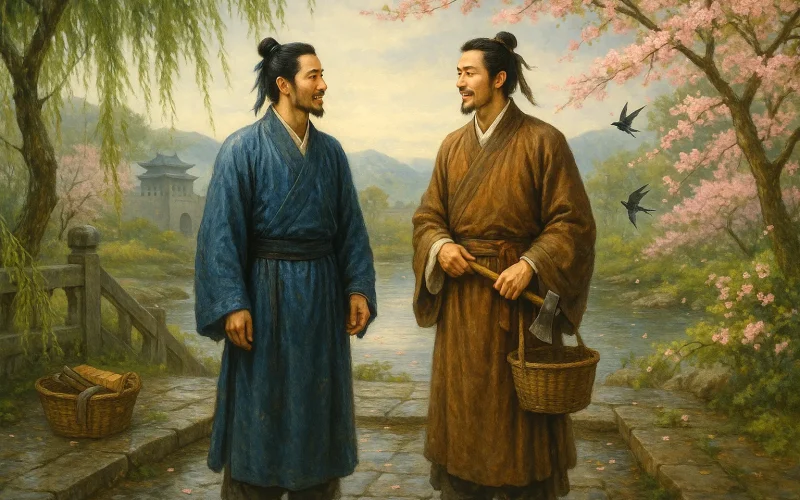My heart has been heavy all day long
Because you have so far to go.
The marriage of a girl, away from her parents,
Is the launching of a little boat on a great river.
…You were very young when your mother died,
Which made me the more tender of you.
Your elder sister has looked out for you,
And now you are both crying and cannot part.
This makes my grief the harder to bear;
Yet it is right that you should go.
…Having had from childhood no mother to guide you,
How will you honour your mother-in-law?
It's an excellent family; they will be kind to you,
They will forgive you your mistakes --
Although ours has been so pure and poor
That you can take them no great dowry.
Be gentle and respectful, as a woman should be,
Careful of word and look, observant of good example.
…After this morning we separate,
There's no knowing for how long…
I always try to hide my feelings --
They are suddenly too much for me,
When I turn and see my younger daughter
With the tears running down her cheek.
Original Poem
「送杨氏女」
韦应物
永日方戚戚, 出行复悠悠。
女子今有行, 大江溯轻舟。
尔辈苦无恃, 抚念益慈柔。
幼为长所育, 两别泣不休。
对此结中肠, 义往难复留。
自小阙内训, 事姑贻我忧。
赖兹托令门, 仁恤庶无尤。
贫俭诚所尚, 资从岂待周。
孝恭遵妇道, 容止顺其猷。
别离在今晨, 见尔当何秋。
居闲始自遣, 临感忽难收。
归来视幼女, 零泪缘缨流。
Interpretation
Composed after Wei Yingwu lost his wife in middle age, this poem captures the moment of his eldest daughter's departure for marriage. Having raised his children alone after his wife's early passing, the poet developed an exceptionally deep bond with his daughters. Now, as his firstborn prepares to leave for a distant home, his heart overflows with reluctance and concern. The verses express not only a father's parting sorrow but also earnest admonitions and unspoken worries about her future married life. This profoundly moving work, considered one of Chinese literature's most touching marriage send-off poems, authentically portrays a father's complex emotions during his daughter's wedding.
First Couplet: "永日方戚戚,出行复悠悠。"
Yǒng rì fāng qīqī, chūxíng fù yōuyōu.
All day weighed with heavy sorrow; Now your journey stretches far tomorrow.
The opening establishes the emotional tone with "heavy sorrow" (戚戚) permeating the entire day, while "journey stretches far" (悠悠) foreshadows the impending separation. The dual temporal framework contrasts present grief with future distance.
Second Couplet: "女子今有行,大江溯轻舟。"
Nǚzǐ jīn yǒu xíng, dà jiāng sù qīng zhōu.
My daughter journeys forth today— Up the great river's course your slender boat will sway.
The "great river" (大江) symbolizes life's vast challenges, while the "slender boat" (轻舟) represents the daughter's vulnerable transition. This juxtaposition highlights paternal concerns about her solitary journey into adulthood.
Third Couplet: "尔辈苦无恃,抚念益慈柔。"
Ěr bèi kǔ wú shì, fǔ niàn yì cí róu.
Motherless since childhood's day, My care grew tender in every way.
The phrase "motherless since childhood" (苦无恃) underscores the family's loss, while "tender care" (慈柔) reveals how paternal love intensified to compensate, establishing the poem's emotional core.
Fourth Couplet: "幼为长所育,两别泣不休。"
Yòu wéi zhǎng suǒ yù, liǎng bié qì bù xiū.
You raised your sisters as your own— Now parting brings tears neither can disown.
The elder daughter's maternal role (长所育) is acknowledged, making this separation doubly poignant. The "unending tears" (泣不休) illustrate the profound sisterly bond forged through shared adversity.
Fifth Couplet: "对此结中肠,义往难复留。"
Duì cǐ jié zhōng cháng, yì wǎng nán fù liú.
This knots my heart with bitter pain, But ritual's call leaves no refrain.
"Knotted heart" (结中肠) vividly conveys the father's anguish, while "ritual's call" (义往) demonstrates Confucian duty overriding personal desire, encapsulating the poem's central tension.
Sixth Couplet: "自小阙内训,事姑贻我忧。"
Zì xiǎo quē nèi xùn, shì gū yí wǒ yōu.
No mother taught you woman's art— Serving new kin stirs fears in my heart.
The "lack of maternal guidance" (阙内训) reveals the poet's anxiety about his daughter's unpreparedness for marital duties, while "serving new kin" (事姑) specifically addresses Confucian concerns about daughter-in-law responsibilities.
Seventh Couplet: "赖兹托令门,仁恤庶无尤。"
Lài zī tuō lìng mén, rén xù shù wú yóu.
Yet noble house receives you there— Their kindness will your faults repair.
The "noble house" (令门) offers consolation, with "kindness" (仁恤) suggesting the poet's trust in the groom's family's virtue to compensate for his daughter's perceived shortcomings in domestic training.
Eighth Couplet: "贫俭诚所尚,资从岂待周。"
Pín jiǎn chéng suǒ shàng, zī cóng qǐ dài zhōu.
Poverty's ways we've always prized— My dowry gifts are ill-sized.
The value of "poverty's ways" (贫俭) reflects Confucian ideals of frugality, while "ill-sized dowry" (资从岂待周) demonstrates the poet's unapologetic honesty about his financial limitations and moral stance against materialistic marriages.
Ninth Couplet: "孝恭遵妇道,容止顺其猷。"
Xiào gōng zūn fù dào, róng zhǐ shùn qí yóu.
Be filial, mild in every deed, Let grace and order guide your speed.
The four virtues of "filial piety" (孝), "respectfulness" (恭), "proper conduct" (妇道), and "graceful demeanor" (容止) constitute the complete Confucian prescription for an ideal wife, showing the father's thorough guidance.
Tenth Couplet: "别离在今晨,见尔当何秋。"
Biélí zài jīn chén, jiàn ěr dāng hé qiū.
This dawn we part—O when anew Shall autumn bring your face to view?
The rhetorical question "when shall autumn" (何秋) uses seasonal imagery to express uncertainty about reunion, with "autumn" symbolizing both the harvest of hope and the withering of separation.
Eleventh Couplet: "居闲始自遣,临感忽难收。"
Jū xián shǐ zì qiǎn, lín gǎn hū nán shōu.
Solitude helps soothe my care, But parting's pang proves hard to bear.
The contrast between "solitude's comfort" (居闲自遣) and "parting's sudden pain" (临感难收) illustrates the father's emotional volatility, showing how theoretical preparation fails before actual separation.
Twelfth Couplet: "归来视幼女,零泪缘缨流。"
Guīlái shì yòu nǚ, líng lèi yuán yīng liú.
Returning, see your sister small— Tears streak the hat-strings as they fall.
The physical detail of "tears streaking hat-strings" (零泪缘缨流) transforms abstract grief into tangible imagery, with the younger sister's presence intensifying the sense of familial rupture through visible emotional contagion.
Holistic Appreciation
This poem weaves paternal love through unadorned yet profoundly moving language. Tracing his daughter's journey from departure to imagined future, the poet connects family emotions like a gentle stream flowing into readers' hearts. Blending respect for social rituals with authentic sentiment, these verses reveal a scholar-official deeply grounded in human experience. Without a single superfluous word, its power lies entirely in genuine emotion.
Artistic Features
The poem excels in delicate emotion and plainspoken fluency, radiating domestic warmth. Through realistic depictions of household matters—"motherless since childhood," "tears neither can disown"—it achieves profound depth via simple phrasing. Contrasts (slender boat vs. heavy parting) and progressive intensification (between sisters' bond) amplify the loneliness. Eschewing ornate diction, its triumph lies in authentic feeling, making it a model of Tang dynasty domestic poetry.
Insight
This work measures family bonds against life's separations. As parents confronting children's marriages, we harbor both reluctance and hopeful advice. The poet channels all emotions into verse, preserving timeless human tenderness. It reminds us to listen for kinship's poetry in life's quiet moments—the softest echo of a meaningful existence.
Poem translator
Kiang Kanghu
About the poet

Wei Yingwu (韦应物), circa 737 - 786, was a native of Chang'an, Beijing. His poems were collected in the Wei Suzhou Collection, which included poems concerned with the plight of the people, expressions of disobedience to the times and indignation against the world, and descriptions of idyllic landscapes, etc., of which the ones describing idyllic landscapes are the most famous, and have been sung by posterity in particular.












